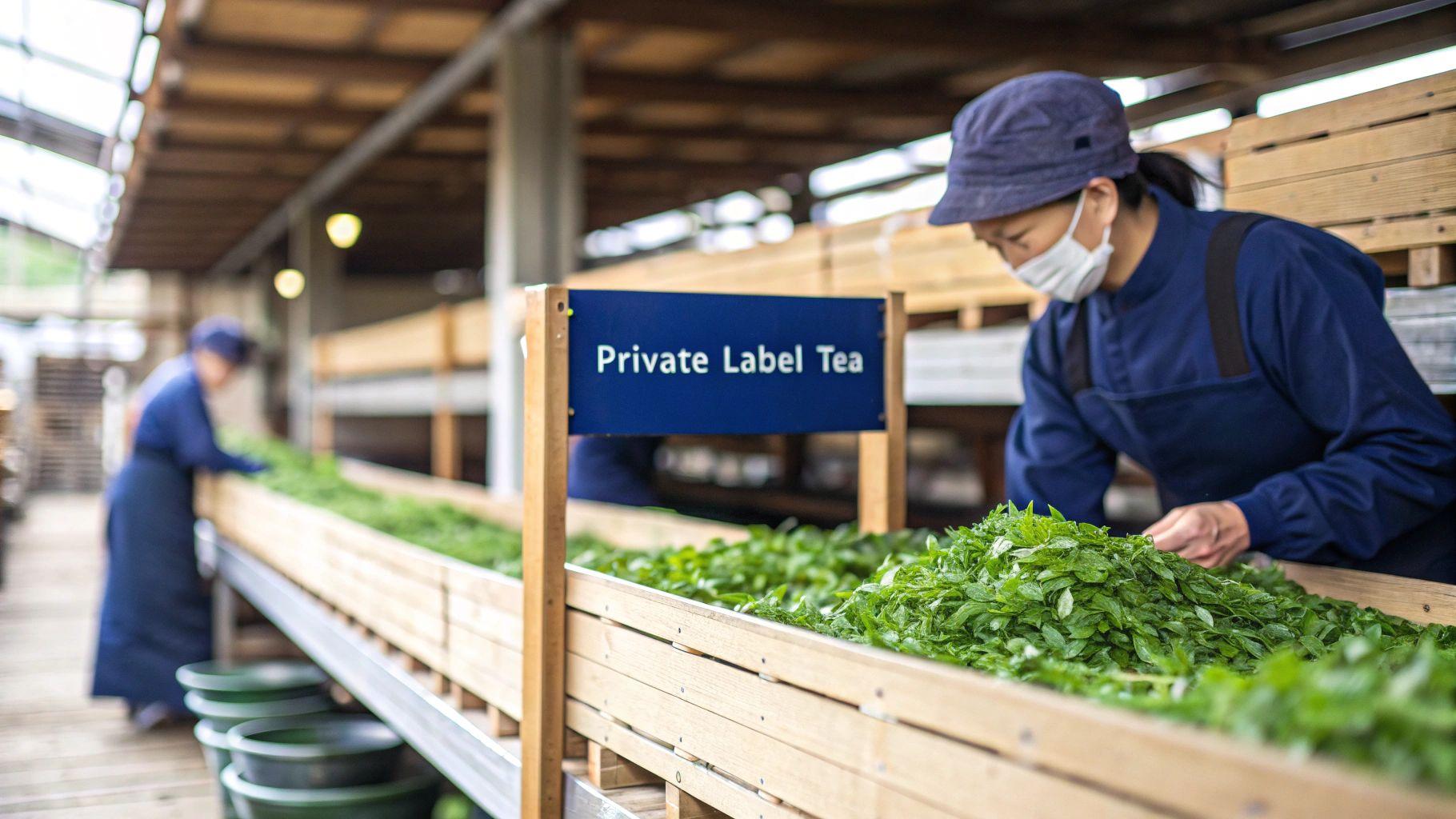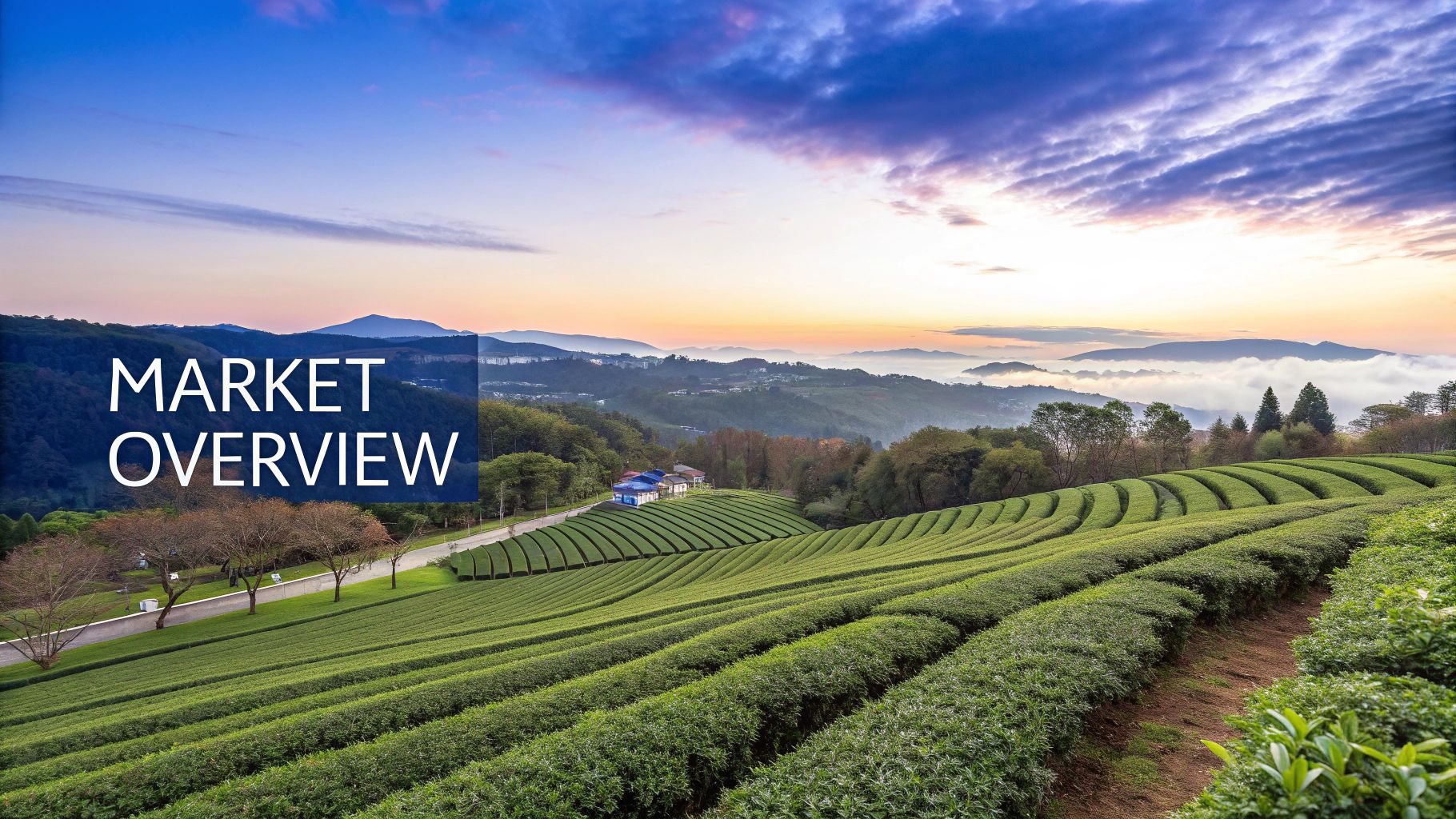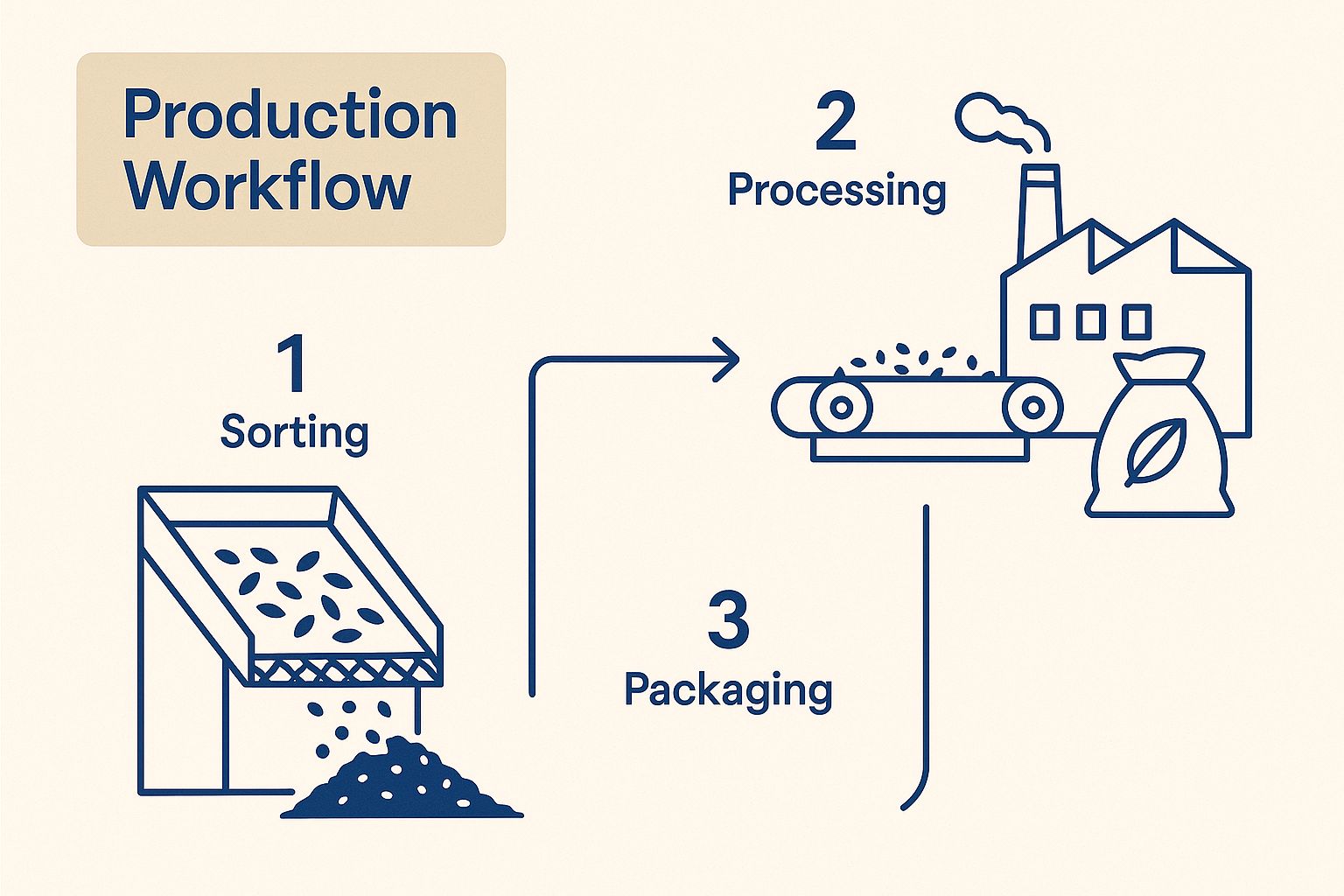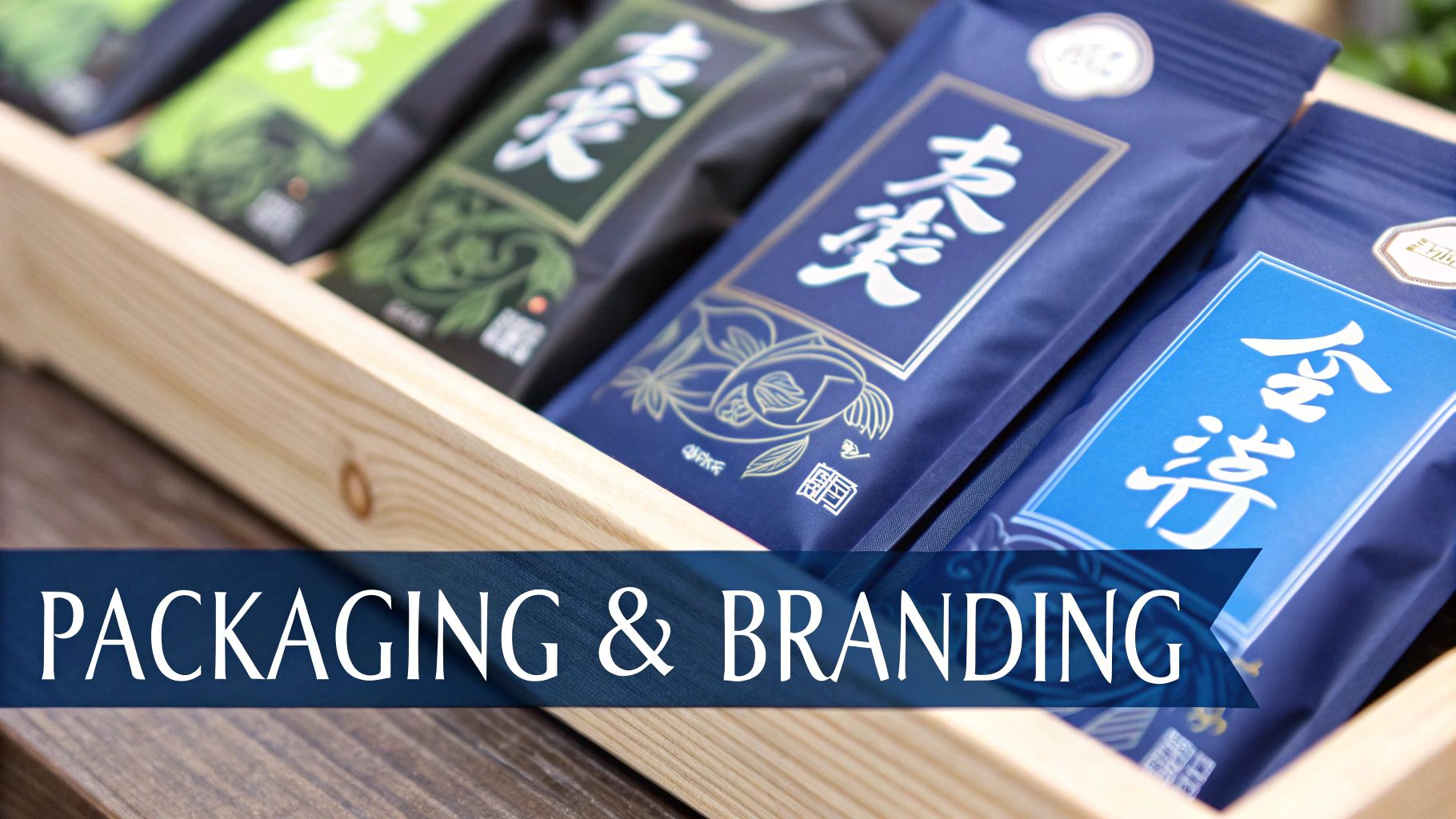Your Partner in Quality & Customization for Japanese Green Tea Private Label Manufacturing
Partner with the leading Green Tea Japanese private label contract manufacturer. Launch your brand with quality, flexibility, and expert support.
 Get a Free Quote Today!
Get a Free Quote Today!Finding the right partner is the first—and most critical—step in launching a successful private label green tea brand. For e-commerce founders and brand managers, this isn't about finding just any supplier. It's about securing a Green Tea Japanese private label contract manufacturer who acts as an extension of your team—your R&D partner from concept through launch. We bring authentic sourcing from renowned regions like Shizuoka or Uji, unwavering quality, and robust manufacturing capabilities to the table.

Finding Your Ideal Green Tea Manufacturing Partner
The path from a product idea to a shelf-ready green tea supplement is more complex than it looks. Your choice of a contract manufacturer is one of the most significant decisions you'll make, deeply impacting everything from your product's quality and brand reputation to your profit margins. A great partner goes beyond basic production; they become a strategic collaborator who helps you navigate the market's nuances.
This partnership is especially vital right now. The demand for authentic Japanese green tea is surging, with the market size hitting approximately 85.68 thousand tons. Projections show it growing to 126.23 thousand tons by 2033. That reflects a compound annual growth rate (CAGR) of about 4.10%, signaling a massive opportunity for both new and established brands. You can dig into the numbers in the full Japan green tea market report.
Core Pillars of a Great Partnership
To find a manufacturer who can help you ride this wave of growth, you have to look past the production line. The best partners are built on three key pillars: quality, customization, and reliability. These are the bedrock of a scalable and successful brand.
- Quality and Compliance: This is the absolute, non-negotiable starting point. Your partner must operate an FDA-registered, cGMP-compliant, and UL-certified facility. This trifecta of certifications ensures every bottle meets strict safety and quality standards, protecting your customers and your reputation.
- Customization and Flexibility: Your brand needs to stand out. A top-tier manufacturer will offer deep customization options, from sourcing specific tea grades from regions like Uji to developing proprietary flavor profiles. They should also be flexible enough to handle everything from small pilot batches to full-scale production runs.
- Speed and Reliability: In the e-commerce world, speed to market is your competitive edge. You need a partner with a proven track record of quick turnarounds, transparent timelines, and on-time delivery. This kind of reliability is essential for managing inventory and keeping up with customer demand without hiccups.
Key Takeaway: The relationship should feel like a true partnership. Your manufacturer should function as your R&D team, providing insights from concept through launch and helping you build a product that truly resonates with your target audience.
This collaborative spirit is what separates the good from the great. When you're vetting potential partners, ask about their experience with brands like yours and their process for guiding new products to market. For a deeper dive into what this process entails, our guide on nutraceutical contract manufacturing offers invaluable insights into what to expect from a high-quality production partner.
Ultimately, finding a manufacturer who is genuinely invested in your success is the first real step toward building a brand that lasts.
To help streamline your evaluation process, we've put together a summary of the most important criteria to consider when you're vetting potential manufacturing partners.
Key Manufacturer Evaluation Criteria
| Pillar | What to Look For | Why It Matters for Your Brand |
|---|---|---|
| Quality & Compliance | FDA registration, cGMP compliance, UL certification, third-party testing | Protects your customers and brand from liability. Ensures consistent product safety and efficacy. |
| Sourcing & Authenticity | Direct relationships with farms in premier Japanese regions (e.g., Shizuoka, Uji) | Guarantees authentic, high-quality raw materials, which is a key selling point for discerning consumers. |
| Customization | Flexible MOQs from pilot to full scale, custom formulation, unique packaging options | Allows you to create a unique product that stands out in a crowded market and scale production as you grow. |
| Reliability & Speed | Proven on-time delivery, transparent communication, rapid turnaround times | Ensures you can manage inventory effectively, meet launch deadlines, and keep customers happy. |
| Expertise & Support | Experience with similar brands, R&D support, market insights | Turns a supplier into a strategic collaborator who can help you avoid common pitfalls and accelerate growth. |
Using these pillars as your guide will help you filter out the noise and zero in on a partner who can truly help your green tea brand thrive.
How to Verify Quality and Compliance in Japan
When you’re building a brand around Japanese green tea, quality isn't just a selling point—it’s the entire promise. For e-commerce founders and brand managers, cutting through the noise of international and domestic certifications is a non-negotiable step. Seeing an acronym on a supplier's website is one thing; actually knowing how to verify that claim is what protects your customers and your business.
A top-tier Green Tea Japanese private label contract manufacturer won't just list their credentials; they'll welcome your due diligence. The process really kicks off when you start asking for documentation and truly understanding what each certificate means for your specific product, especially if you're targeting the US market.
Demystifying Key Certifications
Vetting a potential partner always starts with their core compliance framework. In the liquid supplement space, three certifications are particularly important:
- cGMP (Current Good Manufacturing Practices): Enforced by the FDA, cGMP is the gold standard. It’s a comprehensive set of rules ensuring products are consistently produced and controlled according to strict quality standards, covering everything from facility sanitation to process validation.
- FDA Registered Facility: This is a basic requirement for any manufacturer whose products will be imported and sold in the United States. It doesn’t mean the FDA endorses the facility, but it does mean the facility is on the FDA's radar and subject to inspection.
- JAS (Japanese Agricultural Standard): If you're building your brand on organic claims, JAS certification is absolutely essential. This is Japan's national standard for organic plants and processed agricultural products, and it's your guarantee that the supplier adheres to rigorous organic farming and processing methods.
A manufacturer’s willingness to provide current certificates and answer detailed questions about their quality systems is a direct reflection of their commitment to transparency. If they hesitate, that's a major red flag.
The image below gives you a good look at a typical production workflow. Notice how quality control isn't just a final step, but is integrated at every single stage, from sorting the raw leaves to the final processing.

This visual really drives home the point that compliance is a continuous process, woven directly into the fabric of production.
Actionable Verification Steps
Beyond just collecting paperwork, your due diligence needs to involve direct and specific questions.
Start by asking about their quality control (QC) process for incoming raw tea leaves. How exactly do they test for pesticides, heavy metals, and microbial contamination? Any reliable partner will have a Certificate of Analysis (CoA) ready for every single batch of raw material that comes through their doors.
Next, dig into their third-party testing protocols. Do they send finished products to an independent lab to verify the potency and purity? This is a critical step that provides an unbiased confirmation that what's on your label is exactly what's in your product.
Ultimately, you're looking for full traceability, from the farm to the finished bottle. This meticulous approach to quality is one of the most critical dietary supplement manufacturing requirements you should be demanding from any partner. It’s the only way to ensure your product is not only effective but, most importantly, safe for your customers.
Crafting Your Unique Green Tea Product

The product you put on the shelf is the ultimate expression of your brand's story. A genuine manufacturing partner understands this. They don’t just fill orders; they get in the trenches with you, collaborating to turn your vision into a tangible, high-quality liquid supplement that truly stands out.
When you partner with a top-tier Green Tea Japanese private label contract manufacturer, you're not just buying a product. You're gaining access to a deep well of expertise that transforms a simple idea into a memorable experience for your customers.
This partnership is your entry into a serious market. In 2022, the broader Japanese tea manufacturing industry recorded shipment values around 323.4 billion Japanese yen—that's roughly $2.3 billion USD. Contract manufacturers are the engine for much of this industry, giving brands like yours the power to launch custom products without the massive upfront cost of building your own facilities. You can get a better sense of the scale of the Japanese tea industry on Statista.
Sourcing From Japan's Premier Tea Regions
The soul of any exceptional green tea is the leaf itself. Just like with wine grapes, the specific prefecture where your tea is grown imparts a unique character, or terroir. A skilled partner will be your guide through these subtle but critical differences.
- Shizuoka Prefecture: This is the workhorse of Japanese tea, known for producing huge volumes of high-quality Sencha. It offers that classic, balanced green tea flavor that has broad, dependable appeal.
- Kagoshima Prefecture: If your brand targets health-conscious consumers, this is your region. Kagoshima is a leader in organic cultivation, producing teas with a rich, bold flavor profile.
- Uji, Kyoto: The birthplace of Japanese green tea, Uji is world-famous for its top-tier Matcha and Gyokuro. Teas from Uji are prized for their deep umami and vibrant green color, making them perfect for premium, ceremonial-grade products.
By helping you source directly from these iconic regions, your manufacturer allows you to build a compelling origin story right into your product, backed by a distinct, marketable flavor.
Expert Insight: Here's a real game-changer: work with a manufacturer that has direct access to chashi, or Japanese tea masters. These artisans can blend different cultivars and harvests to create a signature flavor profile that is 100% yours and can't be replicated by competitors.
Modern Innovation Meets Ancient Tradition
While tradition gives your product its soul, modern technology is what ensures its quality and appeal in a competitive market. The best partners are the ones who combine authentic sourcing with the latest production methods.
This is especially critical for ready-to-drink (RTD) beverages and liquid supplements. Look for a manufacturer who uses advanced botanical extraction techniques. This process captures the full spectrum of the tea's beneficial compounds without resorting to harsh chemical solvents.
On top of that, cold-fill technology is essential for preserving the delicate flavor and nutritional profile of green tea. It completely avoids the "cooked" taste that plagues so many products that use older hot-filling processes.
Your journey of customization doesn't stop there. It extends to the final presentation on the shelf. Flexible packaging options—from sleek glass bottles for a premium RTD tea to eco-friendly pouches for matcha powder—are non-negotiable. A great partner will help you select packaging that not only protects the product but also reinforces your brand's identity. This level of detail is exactly what helps create successful private label liquid supplements that grab a customer's attention.
Getting a Handle on Supply Chain and Pricing
A resilient brand isn't just built on beautiful packaging; it's built on a solid grasp of your supply chain and real-world costs. When you're dealing with Japanese green tea, this means looking way beyond a simple price-per-kilogram. The true cost and, more importantly, the stability of your supply chain, are tangled in a complex web of factors. A good Green Tea Japanese private label contract manufacturer is your guide through this maze.
Getting this right is what protects your margins and ensures you actually have tea to sell. The market for premium grades like matcha, for example, is notoriously sensitive to outside pressures. One bad harvest can throw everything into chaos.
The Forces Shaping Your Costs
The price you pay for high-quality Japanese green tea is anything but static. It’s a living number, constantly shifting with agricultural seasons, global economics, and deeply ingrained cultural practices.
Three big factors have an outsized impact on your cost of goods sold (COGS):
- Weather and Harvest Yields: A typhoon, a sudden drought, or an unseasonably cold spring can slash the supply of top-grade tea leaves. When supply plummets, prices naturally climb.
- Global Demand: The world has woken up to authentic Japanese green tea, especially matcha. This puts immense pressure on a supply that is, by its nature, finite. More competition for the same leaves means higher prices for everyone.
- Auction Dynamics: A huge amount of Japan’s best tea is sold at auction. Here, intense bidding wars for sought-after regional teas can cause wild price swings from one season to the next.
We saw a perfect storm of this recently. At auctions for Kyoto matcha, prices shot up to triple what they were the previous year. This was a direct result of skyrocketing international demand colliding head-on with a smaller supply caused by extreme weather. You can see a great breakdown of these market forces on YouTube.
Insider Tip: This is where your manufacturer's relationships are worth their weight in gold. A partner with deep, decades-long connections to tea farmers has a massive advantage. These relationships often give them first dibs on the best leaves and more stable pricing, even when the market is tight.
Strategic Sourcing and Production Planning
So, how do you protect your brand from all this volatility? It comes down to being proactive with your sourcing and production planning. This is where a true partnership with your manufacturer really shines.
A key conversation you need to have is about Minimum Order Quantities (MOQs). Don't just accept the first number you're given. A strategic partner will understand the journey of a new brand. They might offer a smaller, more accessible MOQ for a pilot run to test your concept, and a separate, more cost-effective MOQ for when you're ready for full-scale production. That kind of flexibility is a lifeline when you're managing cash flow.
And for more established brands with a good handle on their sales data, it’s worth asking about forward contracts. Negotiating a contract to lock in your pricing for a six or twelve-month supply can be a game-changer. It shields you from sudden market spikes, gives you cost certainty, and keeps your supply chain humming. That kind of stability is exactly what you need to build a more resilient and profitable business.
Building a Partnership That Lasts
When you're looking for a Green Tea Japanese private label contract manufacturer, you're not just sourcing a product. You're choosing a partner. This isn't about a one-off transaction; it's about laying the groundwork for your brand's future. The best manufacturers don't just act like suppliers—they become a genuine extension of your team, someone who is truly invested in seeing you succeed. This mindset shift is what separates the brands that just get by from the ones that truly flourish.
A real partnership is built on two pillars: crystal-clear communication and total transparency. From your very first conversation, a growth-oriented partner will lay out a detailed project timeline with milestones that are actually achievable. They won't just feed you a line; they'll give you an honest, experience-based assessment to make sure there are no nasty surprises waiting for you down the road.
What a True Strategic Partner Looks Like
The difference between a basic supplier and a strategic partner becomes glaringly obvious once you look past the production line. A standard supplier just fills your orders. A strategic partner, on the other hand, is always thinking ahead. They anticipate your needs, help you navigate challenges, and actively find ways to push your growth forward. They’re constantly refining their own processes to give you an edge.
For this kind of partnership to really work, efficiency is non-negotiable. Digging into the broader business process automation benefits can show you just how a forward-thinking partner might be optimizing their own operations. When they're proactive about efficiency, it has a direct, positive impact on your costs and how quickly you can get your tea to market.
To make this distinction clearer, here’s a quick-reference table.
Manufacturer Capabilities Comparison
This table breaks down what you can expect from a standard supplier versus what a true strategic partner brings to the table.
| Capability | Standard Supplier | True Strategic Partner |
|---|---|---|
| Communication | Reactive, provides updates only when asked. | Proactive, offers regular updates and transparent timelines. |
| R&D Approach | Executes the formula you provide. | Collaborates on new ideas, suggests improvements, and helps innovate. |
| Scalability | Limited to current capabilities; may struggle with large increases in volume. | Plans for your growth, offering solutions from pilot batches to full-scale production. |
| IP Protection | Offers a standard non-disclosure agreement (NDA). | Structures detailed partnership agreements that protect your unique formulas and brand IP. |
As you can see, the value a strategic partner offers goes far beyond simply manufacturing a product. They are an active participant in your business's journey.
Structuring Your Agreement for Mutual Success
A strong partnership deserves the protection of a rock-solid agreement. A standard NDA is a decent starting point, but you need to go further with a comprehensive partnership agreement. This document should spell out, in no uncertain terms, the ownership of any custom tea formulas you develop together. Your intellectual property is your brand’s lifeblood—protect it.
Key Takeaway: Your agreement needs to explicitly cover scalability. How will your pricing change as your order volumes grow? What are the lead times for ramping up production? Getting these specifics down in writing from day one prevents headaches later and ensures your partner is ready to grow right alongside you.
At the end of the day, you're searching for a manufacturer who can deliver the speed and reliability you need to jump on market opportunities as they appear. This means finding someone with a proven track record of on-time delivery and the flexibility to adapt to changing demand. With that reliable operational backbone in place, you’re free to focus on what you do best: building your brand and connecting with your customers.
Your Top Questions About Private Labeling Green Tea
When you're looking to launch a private label green tea, a lot of questions pop up. It's completely natural. Getting clear, straightforward answers is how you build a solid foundation for your brand and make decisions you can stand behind.
Let's walk through some of the most common questions we hear from brand owners who are just starting out with a Green Tea Japanese private label contract manufacturer. Think of this as a frank conversation to get you moving forward with confidence.
What’s a Realistic Minimum Order Quantity?
This is almost always the first thing people ask, and the truth is, it depends. There's no single magic number for a Minimum Order Quantity (MOQ). The final figure really hinges on the manufacturer's size and just how unique your custom formula is.
For a smaller pilot run of a new green tea blend, you can often find partners willing to work with an MOQ around 50–100 kg. This is a great way to test the waters and see how your product resonates with customers without sinking a huge amount of capital into inventory.
However, once you move to a full-scale production run, especially one that includes custom-printed packaging, the numbers change. Expect that MOQ to jump to 500 kg or more.
My Advice: Always ask a potential partner if they're open to smaller test batches. A manufacturer who is genuinely invested in your success will understand why you need to validate your concept first. They should be willing to work with you on a pilot program before asking for a massive commitment.
How Long Does Product Development Actually Take?
Building something great takes time, but you absolutely need a clear timeline. From the moment you have your initial idea to holding a market-ready product in your hands, you should realistically plan for 3 to 9 months. A partner who values transparency will give you a detailed project plan that breaks down every single phase.
Here's a rough sketch of what that timeline usually covers:
- Sourcing & Blend Development: This is where you collaborate with tea masters to get the flavor profile just right. This typically takes 2-4 weeks.
- Sample Approvals: Getting physical samples shipped to you, tasting them, and giving feedback can take another 2-3 weeks.
- Stability Testing: This is a non-negotiable for any ready-to-drink (RTD) beverage. It can take up to 3 months to ensure your product remains safe and stable on the shelf.
- Packaging Design & Production: This usually happens at the same time as testing and can take several weeks, all depending on the complexity of your design.
Can I Just Supply My Own Ingredients?
It might seem like a clever way to control costs or feature a very specific, unique ingredient, but trying to supply your own raw materials to a Japanese contract manufacturer can get complicated—fast. Most reputable manufacturers will prefer to lean on their own trusted network of suppliers.
There's a really good reason for this. By using their established supply chain, they can guarantee 100% traceability. They know exactly where every leaf and ingredient comes from, ensuring it meets strict quality standards like cGMP and the Japanese Agricultural Standard (JAS). This is how they can confidently stand behind the final product's quality, purity, and safety, which ultimately protects both your brand and your customers.
Ready to transform your vision for a premium green tea into a tangible, market-ready product? The team at Triton Nutra Group is here to be your dedicated partner, from the first concept to the final launch. We blend authentic Japanese sourcing with advanced liquid supplement manufacturing to create products that truly stand out.
Request a free quote today and let's start building your brand together.